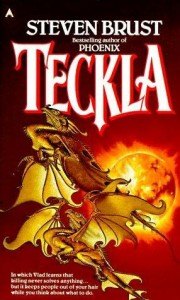
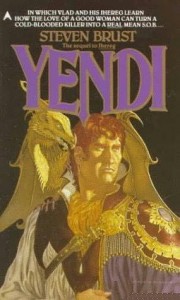
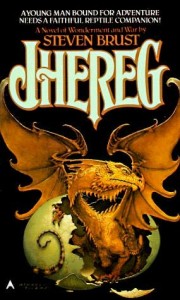 Jhereg (Ace, 1983)
Jhereg (Ace, 1983)
Yendi (Ace, 1984)
Teckla (Ace, 1987)
(These three reprinted in The Book of Jhereg (Ace, 1999))
Taltos (Ace, 1988)
Phoenix (Ace, 1990)
(These two reprinted in The Book of Taltos (Ace, 2002)
Athyra (Ace, 1993)
Orca (Ace, 1996)
Dragon (Tor, 1998)
Issola (Tor, 2001)
Jhereg: The Graphic Novel (Epic Comics, 1990)
Vlad Taltos is a very dangerous man. He has to be, in his line of work. He’s an assassin. He’s an Easterner (what we’d call human) in an empire full of near-immortal, very powerful beings known collectively as the Dragaerians. They have magic, superior numbers, and lifespans that allow them to plan over the course of centuries. They’re faster, taller, stronger, meaner, and possessed of Byzantine codes of honor and traditions that stretch back hundreds of thousands of years. He’s an upstart, daring to play and beat them at their own game.
Long ago, Vlad’s father spent all he had to buy a title within one of the seventeen great Houses of the Empire, becoming part of the Jhereg. These are the assassins, the criminals, the shady dealmakers, what the Mafia could be if given a few millennia to prosper and plan. Vlad’s father thought he was setting his son up for a good life. He was wrong.
Neither fish nor fowl, Easterner nor Dragaerian, holding a title within a noble House but caring nothing for it, Vlad was forced to develop amazing survival skills. And that’s how it all began.
He’s a witch, having mastered some of the arcane powers only Easterners may truly understand. He’s a sorcerer, having learned many of the psychic and magical talents shared by the Dragaerians. He’s got one of the flying lizardlike creatures also known as jhereg as his familiar. He’s going to need all the help he can get, for Vlad Taltos is the sort of man who makes enemies quicker than he can kill them. And this, collectively, is his story.
Over the course of ten volumes now, Steven Brust has charted the career of Vlad Taltos, skipping back and forth out of sequence to give us his beginnings, his endings, his rise and fall within the Jhereg organization. We’ve followed his progress through life and death, war and peace, prosperity and exile. And we’ve truly grown to know this extraordinary man, in his own words, through his own voice.
Jhereg introduces us to Vlad in the prime of his career, already well-established as an assassin and Jhereg businessman, responsible for the illegal and shady dealings in his small area of the great city of Adrilankha.
He’s got a steady business, a network of associates, and a few trusted friends, as well as his beautiful wife Cawti, an Easterner like himself who once killed him. (Hey, love is rough.) We’re dropped into his life, just as things begin to get … messy. It seems a certain important Jhereg by the name of Mellar has absconded with a little bit of money. Like, say, the lion’s share of the House’s funds, to the tune of nine million gold. The Jhereg council wants him very dead, very discreetly, before anyone else can get any funny ideas about robbing from them and surviving. Vlad gets tapped for the job with an offer he just can’t refuse and can’t even talk about.
So Vlad gathers the troops. His trusted lieutenant Kragar, the eccentric psychic Daymar, the legendary Kiera the Thief, and his own loving wife, Cawti. In no time at all, they’ve found the missing Mellar. One small problem. He’s residing at the Castle Black.
Which is the stronghold of the Dragonlord Morrolan, an extremely powerful man in his own right, one of Vlad’s closest friends, and someone who takes a promise of sanctuary very, very seriously. In short, Vlad can’t touch Mellar without sparking another Dragon-Jhereg War. Which would be bad. Very bad.
As Vlad and his allies try to lure Mellar out of his hiding spot in a manner which won’t offend Morrolan, they realize that the plot thickens. Assassins lurk and death is on everyone’s mind as the full extent of Mellar’s plotting and treachery comes to light.
If he dies, it’ll destroy no less than three of the Great Houses. If he lives, the Dragons and Jheregs will inevitably war anyway.
And Vlad’s own life hangs in the balance if he mucks this one up. It’ll take an obscene amount of cunning and split-second timing to bring down Mellar before things go wrong, and even then, help will be needed from the most unexpected quarters.
Yendi takes place before Jhereg. When Vlad goes to investigate a new gambling den that’s been opened in his territory without his permission, he discovers it’s more than a direct challenge, it’s the prelude to all-out territorial war — an expensive, messy, violent, bad-for-business war. The sort of war that gets one killed. Luckily, death isn’t always an absolute in the Dragaerian Empire; in fact, it’s downright common. As long as certain parts of the body and soul remain intact, that is. Thus, we’re introduced to Cawti, the deadly Dagger of the Jhereg, assassin extraordinaire. Once both Vlad and Cawti have paid their respects to the Land of the Dead and been revivified, they find that careers notwithstanding, it’s love (and lust) at first sight. (The couple that slays together, stays together?)
Ultimately, it becomes a question of who benefits from a Jhereg turf war. The answer? Someone with a lot of time to kill, and a rather devious mind. Dragaerian politics run rough and convoluted in the Empire. Unraveling this particular plot will be a true challenge for Vlad, Morrolan, Cawti, and their friends, including the undead sorceress Sethra Lavode, and the feisty Dragonlord, Aliera. But will they solve it before Vlad’s business goes up in flames?
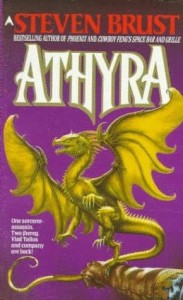
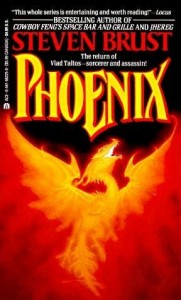
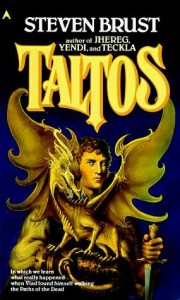 Teckla bounces us to a time period right after the events of Jhereg. A now rich Vlad is thinking of expanding his territory. Cawti is thinking about the rights of Easterners in Adrilankha. Revolution, conspiracy, treachery, assassination and betrayal are all part of the everyday routine for the two lovers as they struggle to maintain their marriage in the face of some truly profound changes in the world around them. Will Vlad stick to his Jhereg loyalties, or seek solidarity with his own people and his wife? Will he join the revolution, or destroy it? And when members of the Eastern group start dying, what will he do to avenge them? It’s mayhem and magic and murder in the way only Vlad Taltos can deliver. It’s an all-out struggle between the classes, and anyone caught in the middle is bound to regret it. Especially our hero, when it comes time to choose sides.
Teckla bounces us to a time period right after the events of Jhereg. A now rich Vlad is thinking of expanding his territory. Cawti is thinking about the rights of Easterners in Adrilankha. Revolution, conspiracy, treachery, assassination and betrayal are all part of the everyday routine for the two lovers as they struggle to maintain their marriage in the face of some truly profound changes in the world around them. Will Vlad stick to his Jhereg loyalties, or seek solidarity with his own people and his wife? Will he join the revolution, or destroy it? And when members of the Eastern group start dying, what will he do to avenge them? It’s mayhem and magic and murder in the way only Vlad Taltos can deliver. It’s an all-out struggle between the classes, and anyone caught in the middle is bound to regret it. Especially our hero, when it comes time to choose sides.
Before we can find out how the revolution turns out, Brust takes us back in time again, to the beginning of Vlad’s career, in Taltos. This is how it all began, folks. How Vlad became an assassin. How he met the enigmatic Morrolan, lord of the flying Castle Black. How he first met the ancient sorceress Sethra Lavode, mistress of Dzur Mountain. How Vlad obtained the mystical gold chain known as Spellbreaker. How he first met the best thief in the world, Kiera. How he first visited the Lands of the Dead in order to return someone very important to life, as opposed to killing them. In all regards, this is the origin story of our hero, explaining a great many mysteries laid out in the first few books, and establishing the hows and whys of his relationships with a very peculiar trio of Dragaerians: Sethra Lavode, Morrolan, and Aliera.
Then it’s on to Phoenix to pick up on Vlad and Cawti’s story. He’s just acquired a very large amount of the city as his territory. She’s still on that revolution and change kick. It’s getting pretty awkward for the two, and their friends. Luckily, Vlad gets a job. Someone needs someone else killed, and he’s perfect for the job. Two problems. The target is the king of an island nation called Greenaere. Vlad’s employer is the Demon Goddess Verra. This is one job he most definitely can’t turn down. Worse, he’ll be going into it without his full magical strength, thanks to some special properties of Greenaere. All in a day’s work, right?
You guessed it. Nothing is ever simple with Vlad’s life. Killing the king is easy, escaping from prison hard. Getting home is a simple matter, with the right friends. Having his wife released from jail after a small misunderstanding involving the revolutionary organization is extremely hard. Stopping the war that breaks out between the Empire, Greenaere, and Elde Island … well, Vlad’s had better days.
The Empire itself threatens to crumble as pressure builds from within and without, and Adrilankha looks ready to sink into chaos and confusion and rioting. Vlad will have to make the most important choice of his life, between life and love, honor and loyalty, Easterners and Jhereg. If he follows one path, he will die. If he follows another, he’ll lose Cawti forever; a third, and the Jhereg themselves will be after him, for they don’t take betrayal lightly. Vlad, Baronet of Taltos, assassin and businessman, witch and sorcerer, will gain everything he’s always wanted … and then what?
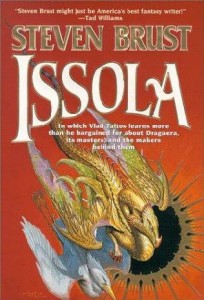
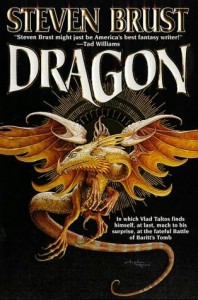
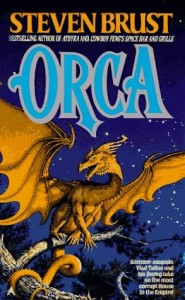 Athyra continues the story of Vlad Taltos as he heads for the hills and into retirement, only to find himself swept up in yet another conspiracy. A few murders, some convoluted plotting, and of course the nastiest people the Jhereg could find, out for his head, any way they can get it. Even as Vlad finds himself with Savn, a young man in need of some training, he realizes that his past can’t be escaped so easily.
Athyra continues the story of Vlad Taltos as he heads for the hills and into retirement, only to find himself swept up in yet another conspiracy. A few murders, some convoluted plotting, and of course the nastiest people the Jhereg could find, out for his head, any way they can get it. Even as Vlad finds himself with Savn, a young man in need of some training, he realizes that his past can’t be escaped so easily.
Vlad always pays his debts. And in Orca he’s up to his eyeballs in repaying them. There’s the matter of the brain-damaged young man who suffered said damage in saving Vlad’s life in the previous book. There’s a wise woman who can help said young man, if Vlad will just do something about the bank foreclosing on her house. And there’s a multilayered paper trail of fake organizations, false names, imaginary companies, and one very dead member of the House of the Orca. The financial fate of the Empire rests upon Vlad’s ability to solve the mystery before it all collapses and throws the Empire into ruin. It’s a shaky house of cards, with Vlad as the man who could topple it all, or save it all. If the Jhereg don’t find him first. Luckily, he has the aid of Kiera the Thief, whose own secrets threaten to shatter everything Vlad thought he knew about her; and a pair of (mostly) loyal jhereg (the flying lizard variety). If Vlad survives this, he could always hang out a shingle as a private investigator!
Speaking of surviving, that’s what Vlad has to do in Dragon, which fills in one of the major gaps in his backstory. Taking place when he was still an assassin and a faithful member of the Jhereg, this book details the fateful events of the Battle of Baritt’s Tomb. In between brutal, action-packed sequences detailing the way of the war, we see how Vlad got himself mixed up in this little mess. It involves the dead Baritt, a room full of the soul-destroying Morganti weapons, and war between two very powerful Dragonlords, one of them Morrolan. In it, Sethra Lavode gets to indulge in one of her favorite pastimes: commanding armies.
Luckily, they’ll find a use for Vlad’s particular talents. Once again, it’s time to ask who benefits, and what the true goal is. Why the two mighty Dragonlords would go to war over a simple theft. Why certain people have to die. And what secret will ultimately be revealed. One of the seventeen Great Weapons is up for grabs, and the fight for it won’t be pretty.
Finally, we come back to the “present” in Issola. Having discharged his responsibilities in Orca, Vlad finds himself at peace in the wilderness, as many loose ends as possible tied up. So naturally it’s the perfect time for Morrolan’s ever-faithful servant, the Lady Teldra, to find Vlad and enlist his help. It seems Morrolan and Kiera have gone and gotten themselves kidnapped by the Jenoine, the very beings who, hundreds of thousands of years ago, were responsible for the very form and function of Easterners, and the various Houses of the Dragaerians themselves. In short, the sort of people who make the gods and demons go weak in the knees and look the other way. Any sane person would run like hell at this point. But Vlad Taltos, good guy and ex-assassin, isn’t that smart. He takes the job, and goes hunting for his missing friends, with Lady Teldra and Sethra Lavode to back him up.
Another small problem. Vlad gets caught as well. And the Jenoine want to hire him. This is even worse than the time the Demon Goddess Verra enlisted Vlad’s help, especially since … well … Verra’s the target. Let’s see. Kill Demon Goddess, or offend the Jenoine. Ever wish you’d stayed in bed? Vlad wishes he’d never even been -born- after that choice.
But even the gods can die. That’s the awful truth that lies in wait for Vlad and his friends as they rush towards a climatic confrontation between the Jenoine and the gods on the shores of the Sea of Amorphia, the mass of magical primal ooze which used to be Dragaera’s greatest city until the Great Disaster descended upon it. (For -that- story, see Brust’s The Phoenix Guards and Five Hundred Years Later, the first two books in a trilogy detailing the Empire centuries before the Taltos books take place.)
It’s a matter of gods, demons, things greater than gods, and a trio of Great Weapons, with Vlad and friends quite thoroughly mixed up in the middle. And someone’s not going home again when it’s all over. But the secret of Spellbreaker, long hinted at, will finally be revealed, and Vlad will be forced to reevaluate his life once more. Failure is not an option, if they want to keep the Jenoine from establishing a measure of power over the world once again….
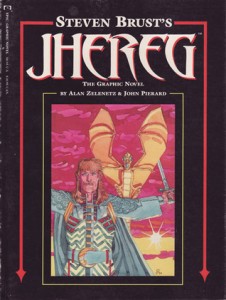
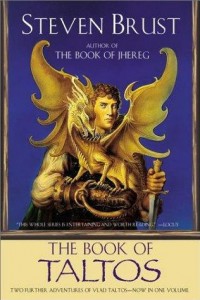
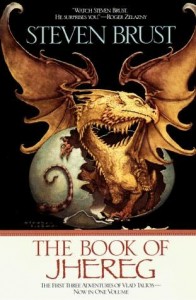 What can I say about the Taltos books? Fast-paced, action-packed, and brilliantly constructed, each one has more layers than an onion, and more twists than a maze designed by a blind man on a drunk mule. The fight scenes are full of swash and buckle, both epic and gritty in extent, easy to visualize and fun to follow. The complexity of the plots and the mindbendingly convoluted nature of the stories make them a joy to try and unravel before Vlad does. It’s all quite sharp, and built on an epic scale. Brust certainly doesn’t think small, with stories unfolding over the course of years, and plans taking centuries to come to fruition.
What can I say about the Taltos books? Fast-paced, action-packed, and brilliantly constructed, each one has more layers than an onion, and more twists than a maze designed by a blind man on a drunk mule. The fight scenes are full of swash and buckle, both epic and gritty in extent, easy to visualize and fun to follow. The complexity of the plots and the mindbendingly convoluted nature of the stories make them a joy to try and unravel before Vlad does. It’s all quite sharp, and built on an epic scale. Brust certainly doesn’t think small, with stories unfolding over the course of years, and plans taking centuries to come to fruition.
The characters are resolutely over-the-top, mixing political treachery, swashbuckling adventure, and high magic, larger than life and twice as fun to watch in action. The majority of the books are told from the viewpoint of Vlad himself, and his sardonic, cynical, world-weary voice is engrossing, giving the books the perfect edge to keep them from being too full of themselves. In fact, it’s only when the books aren’t told from his point of view (such as in Athyra and parts of Orca) that the quality seems to slip and interest wanes.
The world Brust has created for the Taltos books is huge — a sweeping Empire, seventeen Great Houses, a history stretching back over hundreds of millennia, gods and beings greater than gods, and one mere human at the very center of it all. It’s fascinating, intriguing, and thoroughly delightful. Watching the pieces fall into place and the story unfold is a rare joy. It’s the plotting of a Dumas novel and the high adventure of an Errol Flynn movie, told with a voice that would make Humphrey Bogart proud. I highly recommend the Taltos series to anyone who appreciates their fantasy complex and multilayered, and above all else, fun.
You can read them in chronological order, or in publication order, or even in alphabetical order, but luckily, most of them are designed to be read on their own. I accidentally started with Taltos, so I knew how he met everyone and came to be before I read the rest of the series, but you’re free to choose your own order. With the first five books conveniently reprinted in two handsome trade paperbacks (The Book of Jhereg and The Book of Taltos) it’ll be easy to get started. The hard part may be tracking down the remaining books, but it’s worth it.
As an added curiosity, I picked up a copy of the graphic novel adapted from Jhereg, produced by Epic Comics back in 1990. It was adapted by Alan Zelenetz, with art by John Pierard, and it’s a very interesting, stylistic look at the world of Dragaera and the life of Vlad Taltos. I’m still of two minds about it, honestly. It’s not quite how I’d pictured the characters, but it’s still a good take on how they might look. Loiosh, Vlad’s jhereg familiar, comes off perfectly, and Vlad himself carries that unique mix of arrogance and cynical paranoia that makes him the gripping character that he is.
It really does boil down a complex book into too few pages, so that we lose the true complexity of the intricate plot that fuels the story’s progress. However, while some characters don’t look quite right, it does capture the little touches, such as the diminutive (for a Dragaerian) Aliera’s habit of levitating to make up for her height. And the exterior shot of Castle Black is simply gorgeous. Ultimately, though, I wouldn’t recommend it as the ideal adaptation for Jhereg. Too short, too quick, too simple, and it loses much of the beauty of Brust’s words.
That ends our tour of the Taltos books for now, but undoubtedly we’ll rejoin this world when Steven Brust chooses to add to the mythos.
